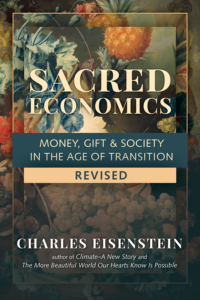Climate — A New Story
Chapters
Chapter 6: A Bargain with the Devil
Why Should I Love My Son?
Cam Webb, a rainforest ecologist, tells me, “The rich, lowland forests of Borneo are almost gone, with their giant trees (the tallest rainforest trees in the world are in Borneo), and many species of huge hornbill birds, and sweet-songed gibbons, and orangutans. When I first arrived in 1989, a green youth, I spent a full year living in the forest. During that year we would often climb to the top of the mountain, and look out into what felt like a thousand miles of unbroken rainforest. Now looking out, you can see that the park is an island in a sea of oil palm.” When I met Cam, he was full of grief. “The rainforests I’ve spent my career studying are gone,” he said. Is he sad because he performs an implicit greenhouse gas arithmetic in which Borneo’s deforestation makes catastrophic climate change X percent more likely? Of course not. He loved those rainforests for themselves, not for their use.
At bottom, carbon arithmetic, even when extended beyond fossil fuel combustion to value the sequestration contributions of fish, grass, and trees, values things for the numbers they generate and not for themselves. Whether we value something for the profits it will bring or for the carbon it will offset, we are still instrumentalizing and objectifying it. The next step is inevitably to exploit and degrade it. Whether we do it to nature or to human beings, the results are ultimately monstrous, even if the initial intention is benign.
I am the father for four boys, including a four-year-old. Imagine I said to you, “Finally my older boys are grown, and now I’ve got another one. What a waste of time and money it is to feed him. I don’t see a good reason why I should bother. Maybe I’ll abandon him—what do you think?”
Imagine then that you replied, “Well, Charles, if you do that you might go to jail for child neglect. And even if you get away with it, he won’t be willing to support you in your old age. Besides, what will the neighbors think?”
“You’re right,” I say. “I guess I’d better take care of him after all.”
Obviously, if I have to ask why I should care for my own child, there is already a problem. No matter how strong the incentives and deterrents used to enforce care, I won’t do as good a job as I would coming from love. I will do just enough to avoid negative consequences. I will do what it takes to satisfy the law and my neighbors. I might meet his every quantifiable need, if I’m closely monitored enough; I might even spend with him the required amount of “family time.” But no list of quantifiable parenting standards can ever substitute for love. Will that family time be perfunctory or heartfelt? You cannot pay me or coerce me or scare me into actually loving my child. And if I don’t actually love him, he will not thrive.
To make matters worse, by citing the law, the neighbors, and my old age as reasons to care for my son, you imply that if I could avoid bad consequences it would be fine to throw him out on the street.
Notice that the three reasons you gave me to care for my son mirror the ways we try to compel pro-environmental behavior. “You’ll get arrested for child neglect”—we bring legal penalties to bear to deter pollution and other violations. “He won’t take care of you in your old age”—we attempt to show that “green” policies are actually good for the corporate bottom line or the national economy. “What will everyone think?”—we appeal to PR considerations to make corporations and governments protect the environment.
The result of such inducements is often perfunctory compliance, evasion, exploitation of loopholes, and outright cheating. The corporation, government, or individual might abide by the explicit regulations while ignoring obvious harm that hasn’t been prohibited by law or appeared on the radar screen of watchdog organizations. Rewards and threats don’t produce real care.
I just looked up “biodiversity loss” on Google, and the number two result was, “How does biodiversity loss affect me and everyone else?” Essentially that webpage answered the question “Why should I care?” with “Because our health and livelihood are threatened.”
Herein lies a problem: that answer also implies that if your health and livelihood are not threatened, then you needn’t care. So, are they threatened? I think yes, but someone who subscribes to the story of technological utopia might say no. He might say that we will invent substitutes for everything the biosphere provides: synthetic food, an artificially maintained atmosphere inside bubble cities, and so forth. Moreover, even if you intellectually accept that biodiversity loss threatens human well-being, there is little in our lived experience to confirm it, since modern life so thoroughly insulates us from nature. How is your health right now? How is your livelihood? If you are sick and broke, can you honestly say that the extinction of the Bramble Cay mosaic-tailed rat or the Rabbs’ treefrog had anything to do with it? Is saving the Yangtze finless porpoise going to help with the next rent payment?
When we propose the question “Why should I care?” and offer an answer, we have forfeited the argument. Caring about other beings, about life, about our planet is aboriginal to our humanness. To offer someone a selfish reason for caring is an insult. It says, “I know you. If it weren’t for the threat to your wealth, health, or ego, you’d be just as happy to trample everything else for personal gain.” Unfortunately, that is the Story of the Self that economics and genetics have offered, asserting that people are fundamentally motivated by self-interest. That way of thinking immerses us. Why are the birds singing? To mark territory and attract a mate. Why are the kittens playing? To practice hunting skills. Why are raspberries so delicious? To invite animals to eat them and poop out the seeds.
I find these answers dispiriting and, like the “Why should I care?” question, insulting to their subjects. I won’t try to outline an alternative to neo-Darwinian genetic determinism in these pages, so I’ll just offer a sponsoring principle: All beings yearn toward the exuberant expression of their life force. Birds sing much more than necessary; kittens play more than they have to; raspberries taste better than they need to. And you too, my friend, yearn to express your gifts in a beautiful way, more beautiful than necessary to secure a living.
The story we hold about another creates an invitation for the other to live into that story. Let us, then, invite each other into that inherent love for life that lies buried, however deeply, beneath the habits and beliefs of Separation. Let us create opportunities to act on that invitation. Because I know you—given half a chance, you will do it.






